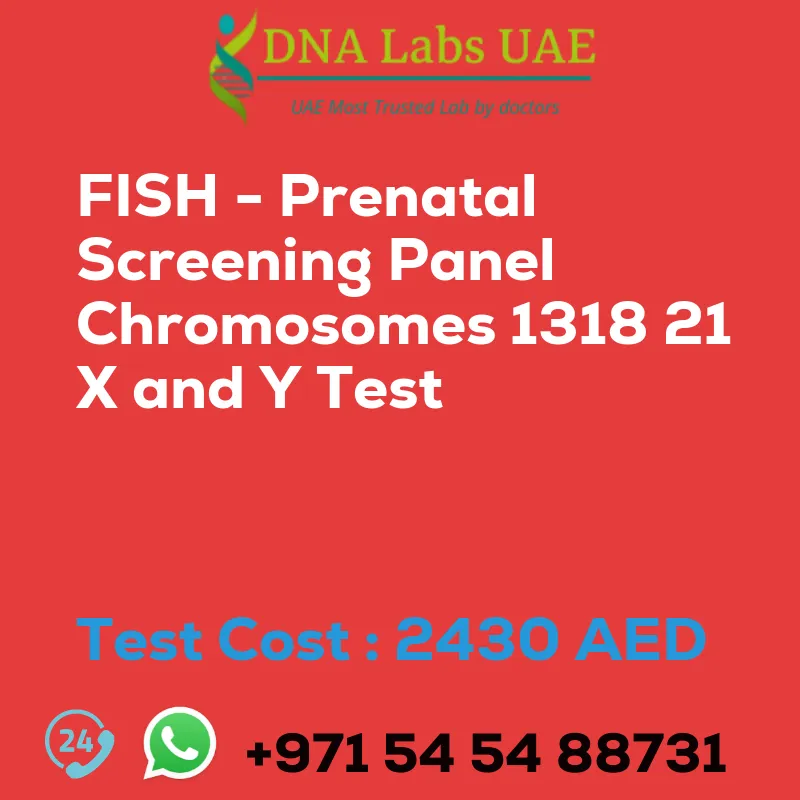FISH – PRENATAL SCREENING PANEL CHROMOSOMES 13, 18, 21, X, and Y Test
Overview
The FISH (Fluorescence In Situ Hybridization) Prenatal Screening Panel Chromosomes 13, 18, 21, X, and Y test is a genetic test used during pregnancy to detect certain chromosomal abnormalities in the fetus. This test is offered by DNA Labs UAE.
Test Components and Cost
- Test Name: FISH – PRENATAL SCREENING PANEL CHROMOSOMES 13, 18, 21, X, and Y Test
- Price: 2430.0 AED
- Sample Condition: 10 mL (7 mL min.) Amniotic fluid in a sterile screw capped container. Ship at 18-22°C. DO NOT FREEZE. Sample to be taken after 15 weeks gestation. Duly filled Prenatal Genetic Testing Consent Form (Form 18) & Chromosome & FISH analysis Requisition Form (Form 17) is mandatory.
- Report Delivery: Sample Daily by 4 pm; Report 4 days
- Method: FISH
- Test type: Prenatal Diagnosis
- Doctor: Gynecologist
- Test Department: CYTOGENETICS
- Pre Test Information: Sample to be taken after 15 weeks gestation. Duly filled Prenatal Genetic Testing Consent Form (Form 18) & Chromosome & FISH analysis Requisition Form (Form 17) is mandatory.
Test Details
The FISH Prenatal Screening Panel Chromosomes 13, 18, 21, X, and Y test uses the FISH technique, which involves fluorescent probes that specifically bind to the chromosomes of interest. By examining the number and arrangement of these chromosomes, the test can identify abnormalities such as trisomy 13, trisomy 18, trisomy 21 (Down syndrome), as well as abnormalities in the sex chromosomes (X and Y).
This test is often recommended for women who have an increased risk of having a baby with chromosomal abnormalities, such as advanced maternal age or a previous pregnancy with a chromosomal abnormality. It can provide early information about the health of the fetus and help parents make informed decisions about their pregnancy.
It is important to note that the FISH test only screens for a specific set of chromosomal abnormalities and does not provide a comprehensive assessment of all possible genetic disorders. If any abnormalities are detected, further testing, such as a full karyotype analysis or genetic counseling, may be recommended to confirm the results and provide more detailed information.
| Test Name | FISH – PRENATAL SCREENING PANEL CHROMOSOMES 1318 21 X and Y Test |
|---|---|
| Components | |
| Price | 2430.0 AED |
| Sample Condition | 10 mL (7 mL min.) Amniotic fluid in a sterile screw capped container. Ship at \n18-22?\u00f8C. DO NOT FREEZE. Sample to be taken after 15 weeks gestation. Duly filled Prenatal Genetic Testing Consent Form (Form 18) & Chromosome & FISH analysis Requisition Form (Form 17) is mandatory. |
| Report Delivery | Sample Daily by 4 pm; Report 4 days |
| Method | FISH |
| Test type | Prenatal Diagnosis |
| Doctor | Gynecologist |
| Test Department: | CYTOGENETICS |
| Pre Test Information | Sample to be taken after 15 weeks gestation. Duly filled Prenatal Genetic Testing Consent Form (Form 18) & Chromosome & FISH analysis Requisition Form (Form 17) is mandatory. |
| Test Details |
The FISH (Fluorescence In Situ Hybridization) Prenatal Screening Panel Chromosomes 13, 18, 21, X, and Y test is a genetic test used during pregnancy to detect certain chromosomal abnormalities in the fetus. During the test, a small sample of cells from the amniotic fluid or placenta is collected and analyzed. The FISH technique uses fluorescent probes that specifically bind to the chromosomes of interest (chromosomes 13, 18, 21, X, and Y). By examining the number and arrangement of these chromosomes, the test can identify abnormalities such as trisomy 13, trisomy 18, trisomy 21 (Down syndrome), as well as abnormalities in the sex chromosomes (X and Y). The FISH Prenatal Screening Panel is often recommended for women who have an increased risk of having a baby with chromosomal abnormalities, such as advanced maternal age or a previous pregnancy with a chromosomal abnormality. It can provide early information about the health of the fetus and help parents make informed decisions about their pregnancy. It is important to note that the FISH test only screens for a specific set of chromosomal abnormalities and does not provide a comprehensive assessment of all possible genetic disorders. If any abnormalities are detected, further testing, such as a full karyotype analysis or genetic counseling, may be recommended to confirm the results and provide more detailed information. |








